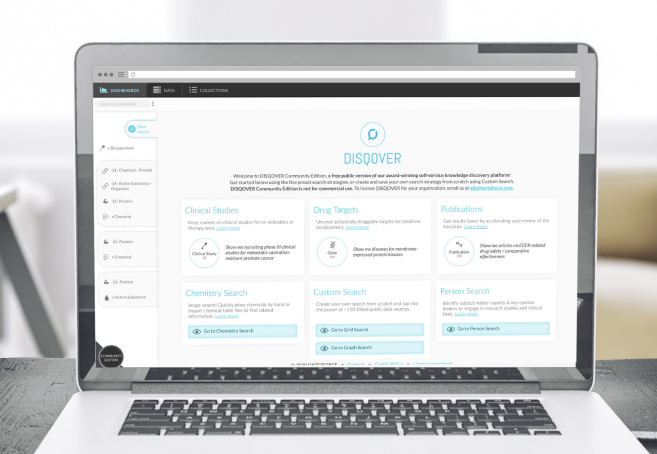
USE CASE
The efficiency of subject recruitment plays an important role in identifying interesting clinical study sites, as it indicates both potential test populations and the site’s recruitment performance. DISQOVER’s intelligent search, filter, and compare capabilities and intuitive visualization features help you make informed decisions that will save time – and money.
For viable clinical trials, it is crucial to find the right people to participate in the testing of a new drug or treatment. That’s why researchers at pharmaceutical companies spend many hours combing through databases, searching for relevant clinical studies, filtering and comparing data to predict recruitment rates, and deciding on the feasibility of a clinical trial and/or the right partner institutions to work with.
To make accurate predictions about recruitment rates, researchers and study designers need access to historical data of specific institutions, e.g., its track record on Parkinson’s disease and other conditions. Large hospitals with good reputations in particular domains will likely draw subjects faster, and significant gains can be made by identifying and addressing these institutions first when setting up a clinical trial. After all, patients who have experienced the most severe symptoms of a disease are obvious candidates for recruitment.
In addition to identifying the right institutions, study designers should consult patient advocacy groups and personal physicians to learn about patients’ perceptions toward a particular condition. A greater understanding of disease awareness can lead to more effective recruitment strategies. For example, research on amyotrophic lateral sclerosis (ALS) revealed that family members of patients with the condition had much higher awareness than general populations. If a trial targeted these family members first, it might not take as long to recruit enough participants.
A pharmaceutical company that wants its clinical trials done correctly should expect nothing less from contract research organizations (CROs). In fact, CROs need experience recruiting from specific hospitals and non-profit organizations in order to deliver successful clinical trials. It is not enough for them to know how the process works; they must also be familiar with local healthcare regulations and practices so that they can tailor their participation accordingly.

Data required to make a decision include:
To make informed decisions based on recruitment rate information, researchers need more than just raw data. Instead, they need to be able to compare and visualize this (un)structured information in meaningful ways to accurately predict recruitment rates.
DISQOVER is a knowledge management platform that helps researchers identify and extract relevant information from unstructured data.
DISQOVER uses a patented natural language processing (NLP) algorithm to extract relevant information from scientific papers, patents, clinical trials, websites, and other documents. The algorithm can effectively identify and extract structured and unstructured data across multiple languages. This includes patient demographics, disease state, study design, and outcomes, among many others.
Extracted data is then organized into one or more knowledge modules in the form of an ontology – a hierarchical structure that organizes concepts by their relationships with each other. NLP-extracted data can be linked to ontology terms via various relationships (e.g., synonyms). From there, researchers can use DISQOVER's visual analytics tools to compare different populations of interest such as patients versus healthy volunteers or responders versus non-responders – all in a single view!
Unlock efficiency and precision in selecting study sites with DISQOVER. Experience a live walkthrough of DISQOVER with one of our experts, and get to see how our powerful knowledge discovery platform can help you accelerate your drug development activities.
© 2025 ONTOFORCE All right reserved